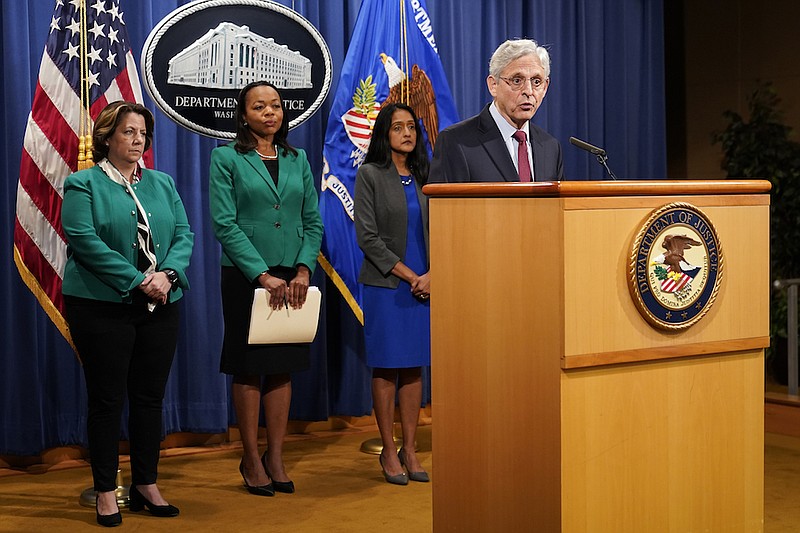The United States vs. Georgia, a lawsuit filed Friday by Attorney General Merrick Garland, draws a long red line in the sand.
"The rights of all eligible citizens to vote are the central pillars of our democracy. They are the rights from which all other rights, ultimately flow," Garland said as he announced the suit that accuses a new Georgia law of effectively discriminating against nonwhite voters and seeks to show that Georgia lawmakers intended to do so.
"Today, the Department of Justice is suing the state of Georgia. Our complaint alleges that recent changes to Georgia's election laws were enacted with the purpose of denying or abridging the right of black Georgians to vote on account of their race or color, in violation of Section II of the Voting Rights Act."
Garland was making good on a promise that he would bolster the Justice Department's civil rights unit to challenge policies and legislation that restrict voter access and discriminate against marginalized voters.
And on Friday, he made it clear that Georgia won't be the only state scrutinized for passing discriminatory voting laws. (As of June 21, 28 restrictive laws had passed in at least 17 states, according to the Brennan Center for Justice, which researches voting and supports expanded access.)
"This lawsuit is the first of many steps we are taking to ensure that all eligible voters can cast a vote, that all lawful votes are counted. And that every voter has access to accurate information. The Civil Rights Division continues to analyze other state laws that have been passed and we are following the progress of legislative proposals under consideration in additional states where we believe the civil rights of Americans have been violated. We will not hesitate to act."
We are greatly heartened by this action, especially in light of Republicans in the Senate filibustering just three days before to block the advancement of the For the People Act, a wide-ranging federal election proposal that would provide nationwide standards for early voting, automatic voter registration, campaign finance transparency rules, limit partisan gerrymandering and provide ethics guardrails for federal lawmakers.
In a vote of 50-50, the procedural vote fell short of the 60 needed to overcome the GOP filibuster. All Democratic senators voted to begin debate, while the Republicans unanimously voted to block it.
Now, this Justice Department's action makes it clear the national shoving match over voting rights will not simply stall. The Biden administration will fight state-level laws it sees as limiting voters' rights.
Georgia's new Election Integrity Act contains several provisions that were passed with a discriminatory purpose in violation of the Voting Rights Act, the Justice Department complaint alleges. The bill ballooned within a few days from eight to more than 90 pages "through a rushed process that departed from normal practice and procedure."
The House held less than two hours of floor debate on the newly inflated bill before Gov. Kemp signed it into law that same day.
Kemp on Friday blasted the federal action, asserting in a tweet that the lawsuit is "born out of the lies and misinformation the Biden administration has pushed against Georgia's Election Integrity Act from the start. Joe Biden, Stacey Abrams, and their allies tried to force an unconstitutional elections power grab through Congress - and failed. Now, they are weaponizing the U.S. Department of Justice to carry out their far-left agenda that undermines election integrity and empowers federal government overreach in our democracy."
Talk about some misinformation and weaponizing. Kemp is still trying to appease Georgia's shrinking Trump voters who thought he didn't do enough to help the losing former president when he refused to interfere in vote counting or call a special session to overturn Georgia's election results and appoint 16 presidential electors who would support Trump instead of then President-elect Biden.
Kemp issued a joint statement in December with Republican Lt. Gov. Geoff Duncan, saying it would violate state law for the General Assembly to name electors instead of following the current state law that calls for the governor to certify electors after results are certified.
Does anyone think maybe that statement might be part of the evidence amassed in the federal lawsuit to show the legislature's intent with their so-called Election Integrity Act? The law does, after all, include a provision that removes the secretary of state from decision-making power on the State Election Board. That was clearly aimed at Republican Brad Raffensperger after he rejected Trump's request that he "find" 11,780 votes to undo Biden's victory in Georgia.
Garland's lawsuit renews our hope just as a recent report by Protect Democracy, Law Forward and the States United Democracy Center, writes: "Across the country, state legislators are proposing bills that would give partisan state legislators greater control over elections make elections more difficult to administer or even unworkable; make it more difficult to finalize election results; allow for election interference and manipulation by hyper-partisan actors; and, in the worst cases, allow state legislatures to overturn the will of the voters and precipitate a democracy crisis."
If that doesn't frighten you, you're wooden.
